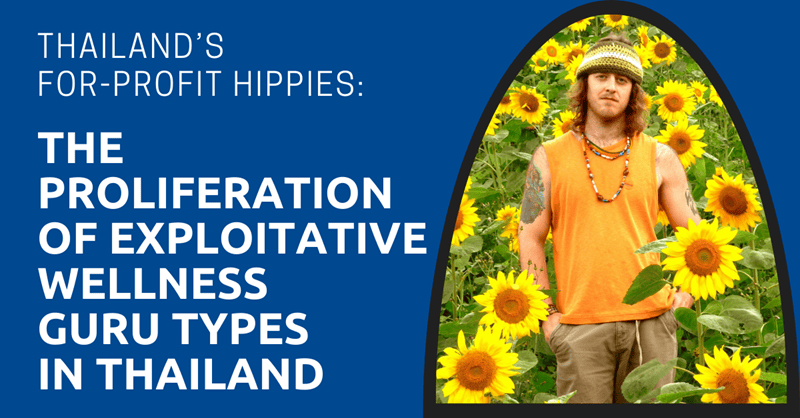
Thailand has long been a magnet for people seeking holistic wellbeing and going on a Thailand Yoga retreat is a lifelong dream for many. With the influx of esoterics and wellness gurus, offering everything from meditation retreats to miracle products and tarot readings, we have to ask questions about the motivations behind their presence and whether their endeavors are truly in line with the wellbeing of local communities.
"*" indicates required fields
Disclaimer: This article is an opinion editorial (op-ed) and represents the views of the author. The opinions expressed herein are solely those of the author and do not necessarily reflect the opinions or views of ExpatDen. Readers are encouraged to consider diverse perspectives and form their own opinions.
Contents
- Is Thailand’s Wellness Industry About Health or Profit?
- The Appeal of Thailand for Wellness Gurus
- Cultural Appropriation, Spirituality, & Wellness
- Preying on Grief and Pain
- MLM Pyramid Schemes in the Thailand Wellness Community
- Gentrification of Wellness Spaces
- How Wrong They Get It
- Reiki - Agh
- The Darkest Consequences - The Koh Phangan Yoga Sex Cult
- There You Have It
- Have Something to Say?
Is Thailand’s Wellness Industry About Health or Profit?
Traditional ceremonies and wellness practices that were once deeply spiritual and meaningful are being transformed into commercial commodities in Thailand for the benefit of the wellness industry, often leaving behind the true essence of the practices. Thailand seems to be particularly attractive to certain types of predatory entrepreneurs.
The Appeal of Thailand for Wellness Gurus
Thailand’s stunning natural landscapes, ranging from lush jungles to tranquil beaches, create an idyllic setting for wellness activities, attracting individuals in search of both spiritual and physical renewal.
The country’s rich cultural practices, deeply rooted in spirituality, further enhance its allure for wellness enthusiasts. Traditional Thai massage, meditation, and holistic healing methods resonate with the values of the wellness community.
Moreover, the relatively affordable Thailand cost of living and easy accessibility make it an appealing destination for wellness entrepreneurs, offering an opportunity to establish retreats, yoga studios, and wellness centers without the financial constraints prevalent in more developed nations.
Cultural Appropriation, Spirituality, & Wellness
Thailand’s facebook groups are strewn with ads from European women offering “tribal” dance classes and “moon circles” alongside stock photos of white women in inauthentic and confused Native American, Indian, and Arabic costumes.
There are seemingly endless French guys with long hair who tout themselves as “Aum Meditation and Healing” Yogis. Slapping the sacred Om symbol on their flyers, commodifying and trivializing something deeply meaningful to Indian religions, including Hinduism, Buddhism, and Jainism.
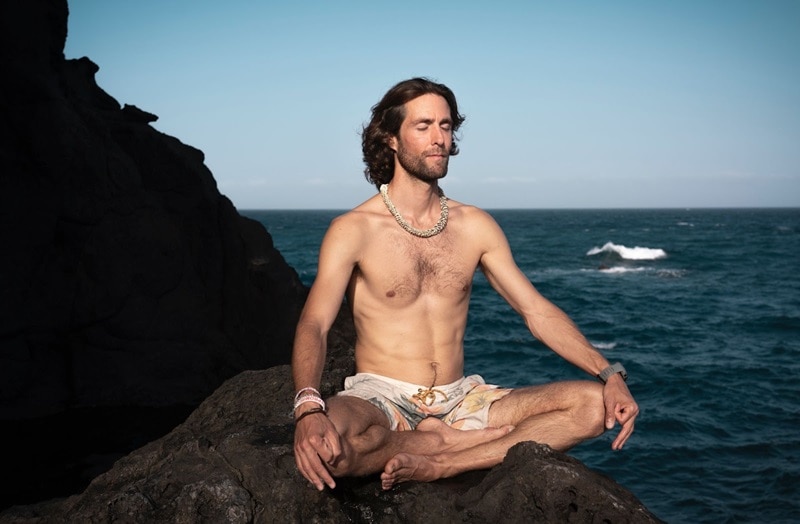
There have even been cases of non-Thai tattoo artists doing sacred Sak Yant style tattoos which are reserved strictly for monks or Sak Yant Masters and are steeped in important Thai cultural rules, traditions, and rituals.
In the Phuket Samui, Koh Phangan, Bangkok, and Chiang Mai Facebook groups, there are endless “gong baths”, “Tibetan” singing bowl sound healing sessions, crystal meditation classes, and Reiki training courses advertised by privileged Anglo men and women. But what is the problem with this?
The issue is of cultural appropriation and misrepresentation of cultures marked by a lack of understanding and respect for ancient and indigenous traditions which perpetuates stereotypes, distorts cultural practices, and contributes to a shallow comprehension of these cultures.
The commercialization of indigenous rituals for personal gain is exploitative, reducing cultural traditions to commodities.
Read more: Cultural appropriation runs rampant within the $4.2 trillion global wellness industry.
Should we be able to dance in any style we want? Yes. Absolutely. Should anyone be able to practice yoga? 100%. No one is saying you can’t enjoy other cultures and their traditions.
The line is drawn when you profit off of another culture, when you misrepresent another culture, when you diminish important aspects of another culture, and when you take the space of the people who actually belong to those cultures you are stealing.
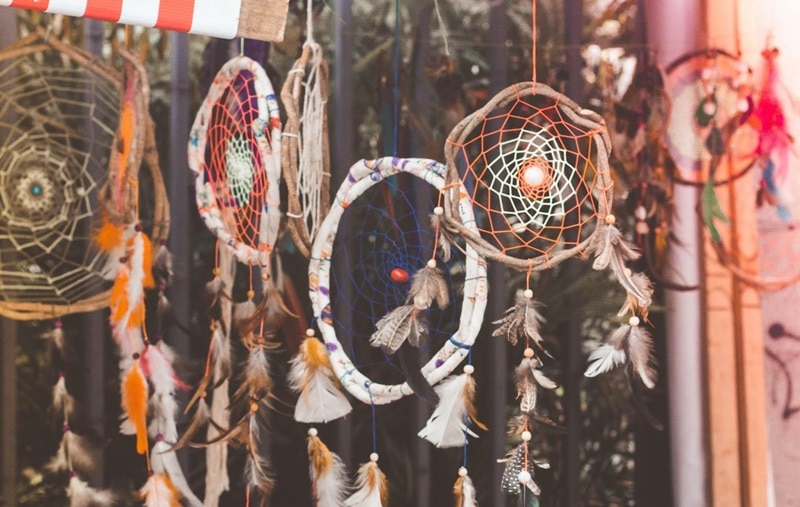
Then put the dreamcatchers down and stop confusing and profiting off their culture.
If you are not South Asian, is saying “Namaste” after yoga class cultural appropriation? No.
Is writing “Namaste” on a t-shirt and selling it as part of your fitness brand along with dream catchers and decontextualized Sanskrit symbols on jewelry cultural appropriation? Yes. Stop it.
Preying on Grief and Pain
Engaging in activities such as yoga, tarot readings, and gong baths can be deeply enriching or fun for some individuals, and if you are a young, healthy, and affluent person, it is easy to understand why you do not see any harm in the industry. However, a pitfall arises when these practices are exploited in a way that preys on grief and pain.
Unscrupulous individuals may take advantage of vulnerable people grappling with emotional, physical, or spiritual turmoil. The allure of alternative therapies can become a breeding ground for opportunistic charlatans who exploit the trust and openness of those seeking solace.
They peddle false promises, manipulating the emotional vulnerabilities of others for personal gain.
MLM Pyramid Schemes in the Thailand Wellness Community
Spend a bit of time in expat groups based in Thailand on Facebook and you will inevitably come across ads for essential oils.
Young Living and doTerra are the most notorious ones, but far from the only ones.
The alarming and exaggerated healing claims promoted by MLM companies and their distributors prompted FDA warning letters. These companies falsely asserted that their essential oils could treat serious conditions like Ebola, Parkinson’s disease, autism, diabetes, and more.
They are exploiting people’s strong desire for healing from severe illnesses without any evidence.
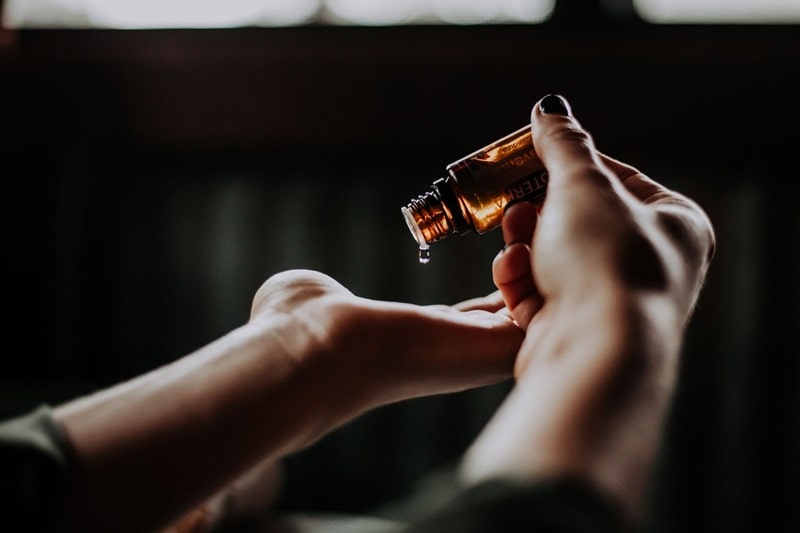
Since essential oils are classified as cosmetics, they lack any FDA regulation. That’s right, there’s no obligation to demonstrate safety or effectiveness before selling these products, and disclosure of potential side effects is not required.
There are massive communities of these snake oil sales people in Thailand, especially in Phuket and on other islands where the wellness community is thick with pseudoscience.
Mormon owned and from Utah, doTerra Thailand was established in 2021 with its pyramid scheme tactics and hit the market hard, promising all the usual MLM things like being your own boss, working from home, and getting rich quick.
In reality, the only real way to make money when involved in an MLM is by predatory recruiting of others to become sellers. Small communities become quickly saturated with sales people who use high-pressure tactics to recruit more and more members.
Regular Thai people are forking over thousands of baht for bottles of poor-quality, mass-produced oils and the profits are going straight back overseas. They are being told that these oils will cure every problem they, and their families, have.
For more information about the terrifying dangers of MLMs, this John Oliver segment really sums it up perfectly.
Gentrification of Wellness Spaces
Thailand wellness tourism can boost local economies, but the distribution of profits is questionable.
The influx of wellness entrepreneurs in Thailand can contribute to the gentrification of areas, driving up prices, and displacing local practitioners. This transformation may cater to a more affluent clientele, further distancing the wellness industry from the authentic Thai experience.
As these practices are commercialized, traditional healers and practitioners from these communities may find themselves marginalized or excluded from the economic benefits generated by the wellness industry.
Instead of signing up for a genuine Buddhist meditation session with a Thai local who has studied the practice their whole life and served as an apprentice monk, Susie and Becky are giving exorbitant amounts of money to Wendy and Johan for a session of “wine yoga” or “yoga with puppies” or some other gentrified, appropriated mess.
Mixing alcohol and yoga is a great example of the distortion of this age-old spiritual, physical, and mental practice.
Traditional Yogic texts and the majority of yoga schools strictly forbid the consumption of alcohol. Numerous practitioners argue that drinking creates a disconnect from one’s body, contradicting the fundamental purpose of yoga.

When sacred rituals and practices are commercialized by every fitness instructor in Thailand without proper understanding or respect, it is simply exploitation.
This profit-driven approach may lead to the extraction of valuable aspects of local traditions without giving back to the communities that originated these practices.
The appropriation is a one-sided transaction that disproportionately benefits the appropriators.
How Wrong They Get It
As one example, Tibetan singing bowls – which are extremely popular in Thailand – are not some ancient ritual from the Himlayas.
Historical records indicate that the metallic bowls in question initially served as food bowls in North India or Nepal. These bowls have undergone a transformation, becoming objects that are fetishized through an orientalist lens.
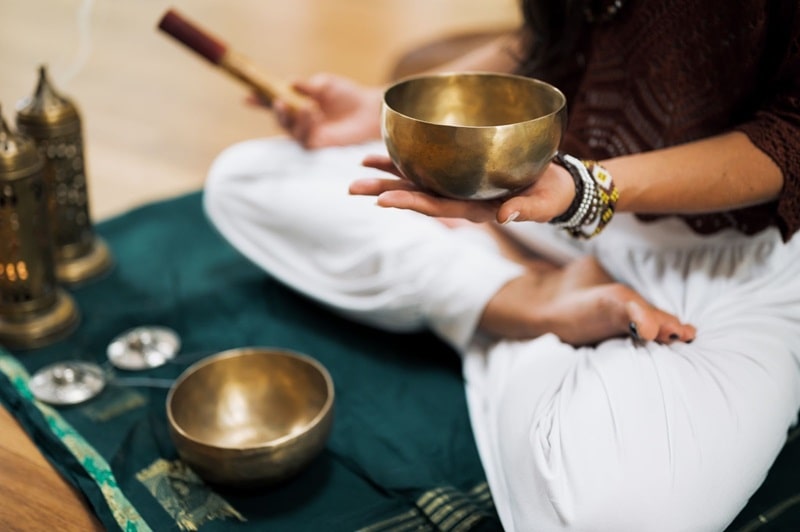
Do sound baths help people? Maybe. There is little scientific evidence, but if they make you feel good, then go for it. People purport they reduce anxiety and stress. The results are similar to those of other sound therapies and meditation methods.
The issue is when you – as a non Tibetan person – profit off the fetishization of Tibetanness.
You don’t have to take my word for it though. Please read this article written by a Tibetan person on why mass-produced fake bowls being sold as ancient Tibetan instruments is a harmful practice.
Reiki – Agh
There are dozens of Reiki training schools popping up all over Thailand.
And along with that, there are thousands of people in Thailand who have completed a short course who are now claiming they can cure your very real medical problems with magical powers which radiate from their hands.
Reiki is so problematic in so many ways.
One main reason behind this is actually pretty interesting: The person who introduced Reiki to the USA from Japan – Sensei Hawayo Takata (1900 – 1980) – fell victim to the backlash of the World War II Executive Order 9066.
On February 19, 1942, this order authorized the forced removal of Japanese Americans to concentration camps. The United States forcibly incarcerated at least 125,284 people of Japanese descent.
The racism, xenophobia, and anti-Japanese sentiments that reached their peak during World War II set the groundwork for the prevalent whitewashed and appropriated form of Reiki witnessed today. Much of the Japanese cultural heritage, history, and traditions that form the basis of Reiki were taken out to render the teachings more palatable to affluent white students.
You should read more about Reiki and Cultural Appropriation here.
These days, most of the Reiki that has been popularized and taught in Thailand (and around the world) is trademarked by an old white millionaire – William Lee Rand. Reiki is a scam.
Reiki lacks substantial scientific evidence supporting efficacy, relying on anecdotal rather than rigorous empirical support. Claims of healing various health conditions lack solid backing. Unlike conventional practices, Reiki lacks standardization in techniques and training, with no universally accepted guidelines for practitioners.
Practitioners undergo non-standardized training in the form of brief workshops, and the absence of a centralized governing body or regulatory authority contributes to a wide range of practices and qualifications within the field, lacking oversight mechanisms to ensure adherence to ethical standards and consistent training.
If you truly believe that any person can do an online weekend-long course that will give them the magical power to shoot healing energy out of their hands and into your body without even touching you, well… I guess I will probably never change your mind.
The Darkest Consequences – The Koh Phangan Yoga Sex Cult
In the most extreme cases, wellness practices can become cult-like.
I’m sure you remember “Guru Swami Vivekananda Saraswati” – real name Narcis Tarcau from Romania. Who created an atmosphere and culture where rape was performed under the guise of spiritual healing so that he and his other male teachers could brainwash members and force themselves on them.
In the end, 31 women submitted testimonials against the Agama Yoga school on Koh Phangan but today, disgustingly, that school and that guru are still open and operating in the same location.
Recently another Romanian – Gregorian Bivolaru – was arrested for rape, human trafficking and kidnapping all under the guise of yoga and spitural enlightenment.
Bivolaru founded a network called the Movement for Spiritual Integration into the Absolute (MISA) in 1990 before it became known internationally as Atman – the International Federation of Yoga and Meditation.
In fact, sexual abuse by yoga gurus is such a regular occurance that it has it’s own Wikipedia page and there are endless articles and papers written on the subject.
There You Have It
While the wellness industry has undeniably contributed to Thailand’s appeal as a global wellbeing destination, the appropriation of wellness terms and rituals by some individuals raises valid concerns.
Striking a balance between sharing wellness practices and respecting cultural origins is essential to avoid perpetuating harmful stereotypes, commodification, and exploitation.
Responsible engagement with local traditions ensures a more meaningful and mutually beneficial integration of wellness practices into the global landscape.

For-profit Thailand hippies should take some time to meditate on their intentions. Are you just here to make money? Do you use terms and instruments from another culture of which you are not part and do not fully understand? Are you twisting and bastardizing ideas stolen from ancient rituals for profit? Do you – in any way – give back to the local community from whom you take your ideas?
Have Something to Say?
If you feel that I have missed anything here, or you have the strong desire to lecture me about how Reiki magically cured your herniated disc, please do leave a comment below and we might address it.



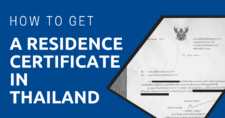
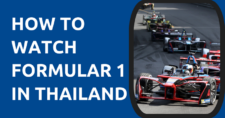

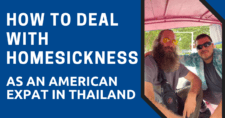
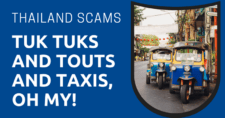

Gregorian Bivolaru school is also known as the Atman federation and opperate a school and ashram in Chiang Mai called Mahasidha yoga.